Is Vanlife Legal?
March 11, 2024
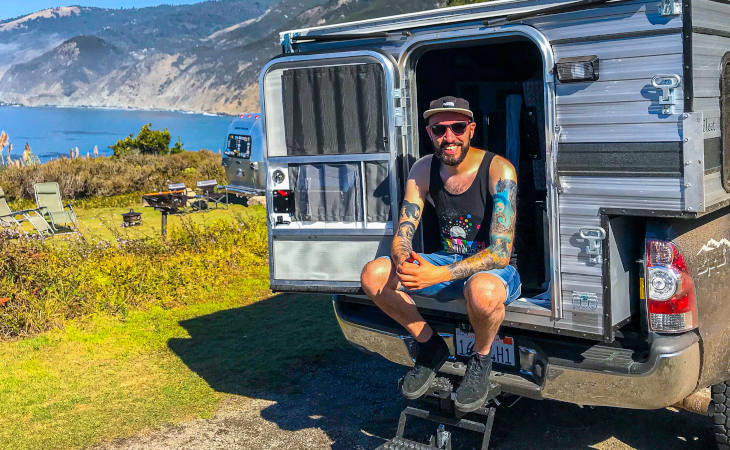
Photo credit @sebsantabarbara
‘Am I allowed to do this’ is a question I have been asked by people since I began my travel-writing journeys back in 2017. It’s one of the main things that stops people from venturing out on van life journeys, which is why I’m tackling this topic with Lippert today!
If you’ve clicked on this article, then the chances are you’re almost finished with your van build and are ready to head out on the road. I’ve used my experiences of van life in the UK and Europe and current guidelines to help put your mind at rest and prepare you for travels away from home, along with some helpful tips on where to find parkups along the way and what to do when you get there!
N.B – this article is going to focus on wild camping or boondocking as that’s my area of expertise and, from my experiences, the best way to get to really know a country. If you’re looking to camp solely in pre-booked campsites, then there are no legal ramifications bar ones stipulated by each individual campsite owner.
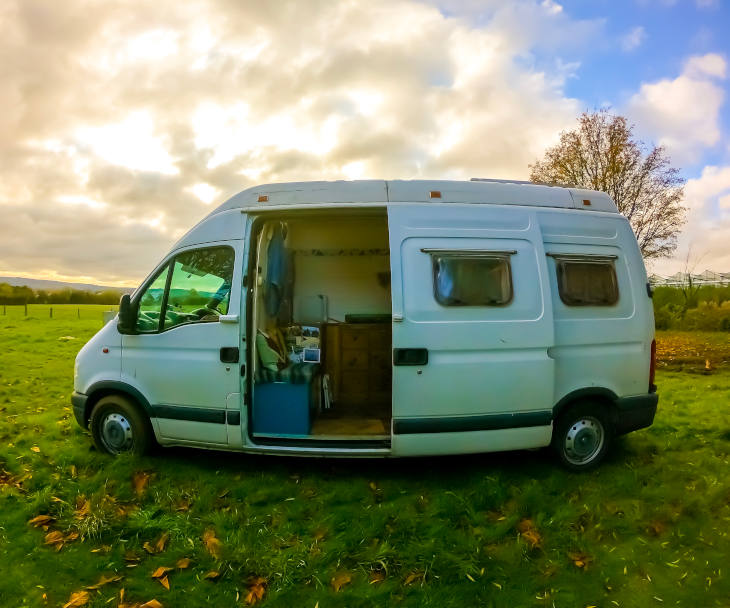
Photo credit @sebsantabarbara
Vanlife After Covid
Everything changed in the van life world after the coronavirus pandemic. I was lucky enough to do a lot of my travelling before the world went into lockdown in a time when people were encouraged to visit and explore new areas. The tourism world might have returned to normal, but the van life world is still feeling the aftereffects.
Signs for ’no parking’ went up everywhere, people were discouraged from traveling to new areas, and van lifers were seen as a bit of an inconvenience. As someone who lived full-time in a van for many years, I can tell you this was and is totally untrue. Most of the time you’re on your own in the middle of nowhere and not around other people!
I just want to touch on this point now before moving on, as it’s important to know why I’m saying some of the things I’m saying below when I reference how things were compared to how things are now to give you some context.
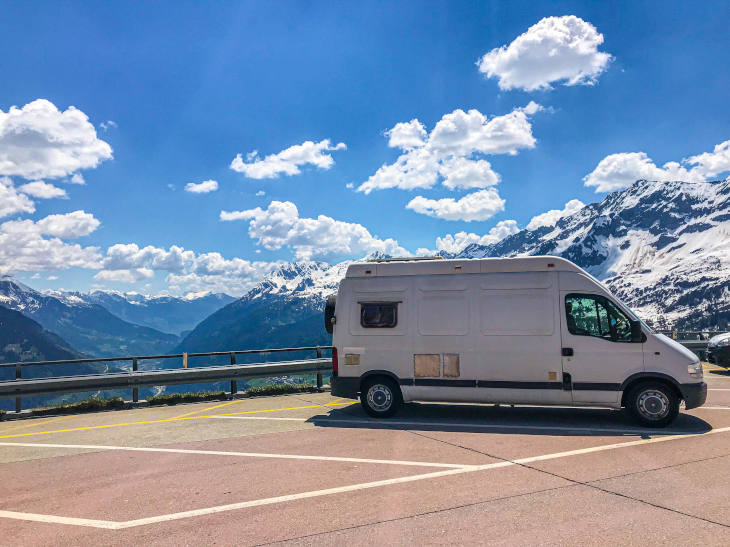
Photo credit @sebsantabarbara
Is Vanlife Legal In The UK?
The easy answer to this question is yes, van life is generally legal in the UK in the sense that there is no law stating that you can’t live in a van or any other vehicle so long as that vehicle meets legal guidelines.
That essentially means that your car is road legal, taxed, and has an up-to-date MOT, a check that makes sure your car is safe to drive.
I’m starting off with van life in the UK as I’m UK-based and built my campervan outside of the terraced home that I rented back in 2017. Most people thought that I was mad to live in a van full-time, but the concept of a tiny home was one that excited me, especially because I knew I was going to be saving so much money in the long run, money I could put towards travelling!
While living in a van is legal, parking anywhere you like is something that is frowned upon by locals and local authorities, and it’s important to pick great parking spots in areas that are out of the way or that allow you to hide in plain sight.
For example, you can’t just decide that you are going to park in the very centre of a sports playing field or in front of a garage that needs access on a busy street, or decide that you’re going to commandeer one car-parking space in the gym car park for the next year. You can, however, park on a long road that boasts free parking next to a racecourse that other people use when finding parking for work, or in forests that have designated parkup spots.
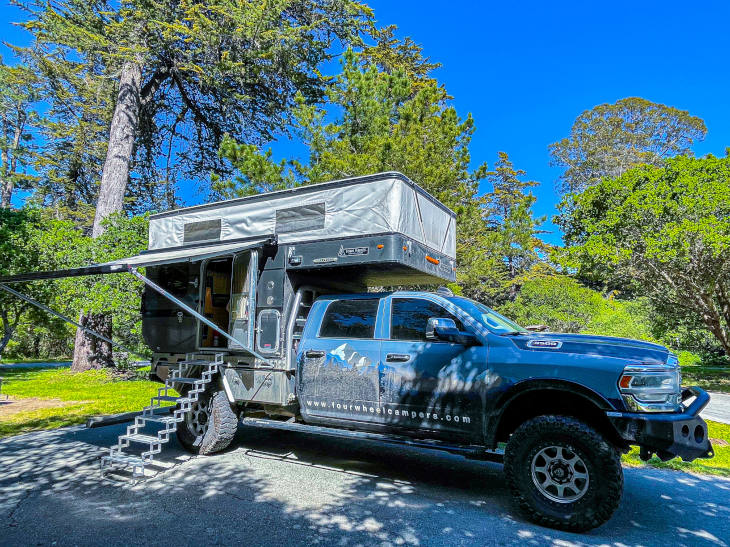
Photo credit @sebsantabarbara
Likewise, if there are free-parking spaces on the cusp of industrial estates, then you can park there near the other delivery vans and blend in without causing any bother. As long as you’re not being an inconvenience to other people, then there’s no reason why you can’t enjoy your van life adventures in peace.
Websties like Britstops and apps like Park4Night show places where campers can park for free in the UK, with many rural areas allowing campers to park for short stays before moving on and farmers that are more than happy for you to pitch up on their land.
Regulations change as you pass through different areas, however. Scotland, for example, has a free camping policy everywhere on public land, whereas the Lake District in Cumbria has a ban on wild camping unless you are in specific designated camper spots. Rangers are a little more vigilant these days since the Covid pandemic, so do your research before heading out into National Parks.

Photo credit @sebsantabarbara
Is Vanlife Legal In Europe?
Van life is generally tolerated in most European destinations, but the notion of whether wild camping is legal or not differs between different countries.
I spent 15 months driving around Europe full-time and had lots of mixed experiences when it came to van life. The French, Germans, and Italians love a good camping trip, and there are lots of facilities available for campers to take advantage of.
Let’s take Sardinia, for example, my favourite place on earth where I parked in the same spot for a week at a time while writing my books by the ocean. Compare that with Slovenia where there are only two designated campervan spots in the entire country that allow free camping. Between the two, you’ve got two very different vibes.
I explored all of Northern Italy pre-pandemic and was pleasantly surprised by how many free aires there were, places where campers could park up for free and take advantage of water and dumping facilities provided by the local municipalities. I parked in aires and on free parking locations listed on Park4Night in and around major cities and in rural areas in the countryside with little to no trouble.
I say ’little-to-no’ because one of my parkups that I found at night happened to be in a crematorium car park, though I didn’t realise that till the Carabinieri woke me up in the morning and I promised I would use my social media platform to urge other vanlifers not to visit the area. This is what happens sometimes when you park up in the dark, and we all know about what happened when I parked up near a stately home in Stupingi…
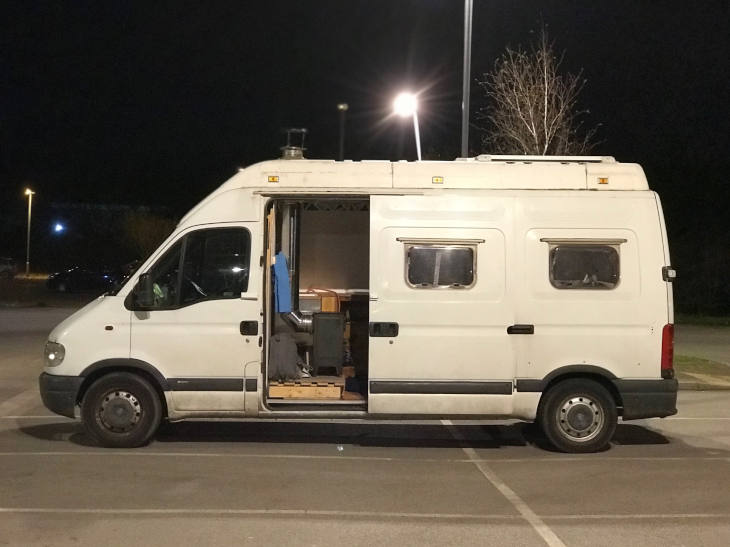
Photo credit @sebsantabarbara
Portugal is incredibly geared up for campervans, with Intermarché stores boasting 48-hour camping and a place to empty your toilet, all with the hope that you would do your shopping there too, which I regularly did.
Spain allows wild camping so long as you don’t put out plastic chairs or an awning and keep everything self-contained. France basically welcomed me with open arms and had so many toilet-emptying stations that I was spoiled for choice!
If a place states that there will be a fine for camping, then obviously you should not camp there. I can’t stress that enough. And you will be fined. There are plenty of options on camping apps and websites that will be suitable, so don’t think that you will be the one to avoid the fine. If you are unsure as to the regulations in your area, then check out the rules on the local council website for where you plan to park up, and plan your route in advance.
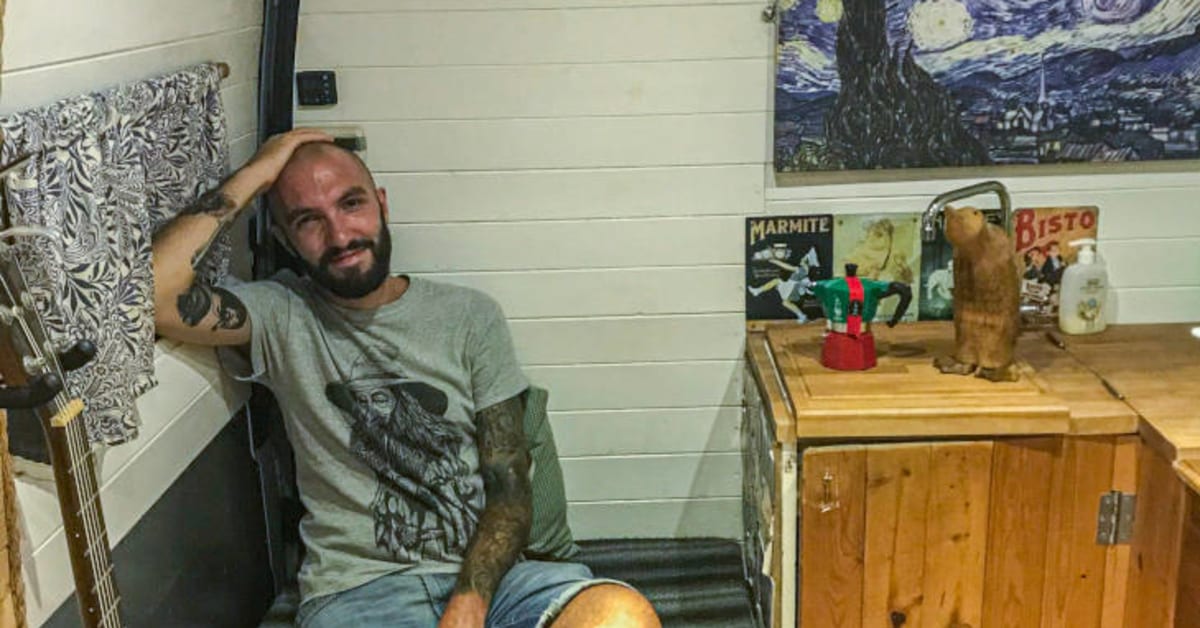
Photo credit @sebsantabarbara
As I said in my section about camping in the UK, it’s all about not being a nuisance. Parking up in a lovely forest or in a rural area, such as in the foothills of Trastanello in Liguria, is much more tolerated than trying to park up outside of the Colosseum in Rome. Likewise, camping in certain areas of the Schwarzwald is more tolerated than in Frankfurt, for example. Although I do know a lot of people that live in vans in Berlin! Portugal has since had more parking bans in the Algarve because of campers arriving en-masse and making a real mess, so we all need to be respectful, clean, tidy and not overpopulate areas unnecessarily.
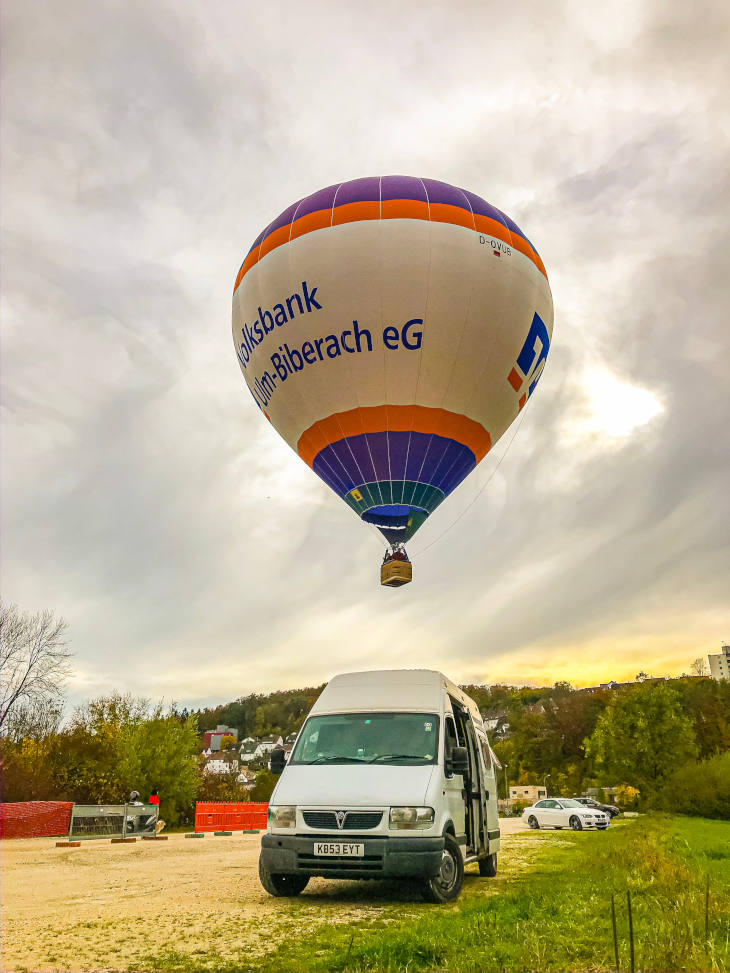
Photo credit @sebsantabarbara
Regulations On Converting A Camper
One thing I would say is that the regulations on whether you can convert a campervan from scratch like I did vary from country to country. In the UK, it’s possible to make a van yourself and follow some simple requirements to convert it into a campervan with the DVLA. Whereas in Italy, you have to make sure that any campervan building work has been carried out by a professional, making it much more expensive to build a van yourself. That’s why a lot of my Italian van life friends tend to buy older factory-built campervans and spruce up the interior rather than creating a build with their bare hands.

Photo credit @sebsantabarbara
Final Thoughts
To summarise for everyone too impatient to read through this article or for the people who are about to bed down for the night and wondering whether they will be arrested in the morning:
- Vanlife is legal in the UK so long as your vehicle is road legal.
- Vanlife is tolerated in most European countries providing you stick to the rules, don’t make a mess, and follow information left by both locals and fellow travellers on apps like Park4Night and iOverlander.
- You are also allowed to sleep in motorway rest stops if you feel too tired to drive.
- Don’t park in places that are private or that might cause offence to locals (I refer again to the crematorium above and am still very sorry for that!).
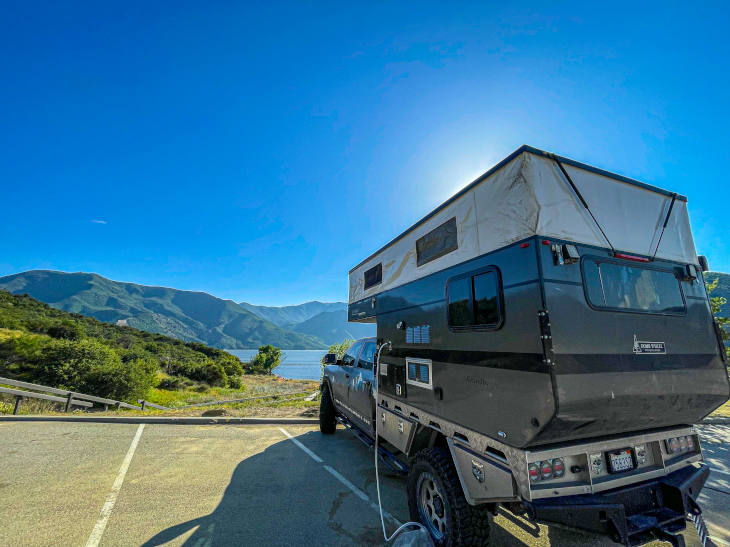
Photo credit @sebsantabarbara
About the Author

Lippert guest blogger, Sebastian Antonio Santabarbara, is a thirty-two-year-old writer from Yorkshire, UK. His first breakthrough role came as the Head of Written Content for Van Clan, an online media brand documenting the van life movement with a weekly reach of over 5 million readers. This role has led to Sebastian being head-hunted to write several inspirational non-fiction books on alternative living (to be published by Frances Lincoln 2022/23) and Van Life for Dummies (published by John Wiley & Sons Sept 2022). He is also the Editor in Chief for Retro Dodo, a media/news company with a monthly reach of 1 million people. Follow his travels on Instagram!
Recent Posts
7 Best Countries for Wild CampingTop Tips for Self Van Builders
5 Best Camper Van Batteries
Common Van Life Problems and How to Combat Them
How Much Does Vanlife Cost
How to Save Space by Choosing the Right Campervan Bed Insights From Vanpuravida
5 Easy Van Life Recipes
Is Vanlife Legal?
Expert Tips for Cleaning a Campervan
Things You Need to Know When Living in a Camper
View All ›
Never miss a blog post!
Subscribe to Lippert’s blog and receive an email when a new one is posted.